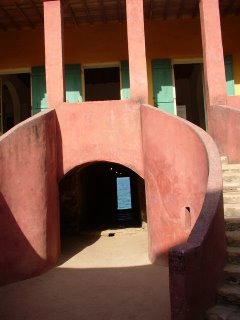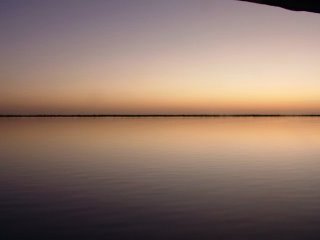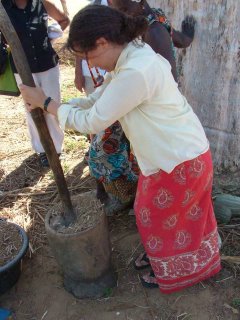A Bird in the Hand...
comments on strategic challenges, life, and other reflections..
Thursday, December 15, 2005
Wednesday, December 14, 2005
Congress on the Solidarity Economy--Dakar, Senegal
In the last two weeks of November, a delegation from Niger traveled 6,000 kilometers in buses on difficult roads to attend the third Congress of RIPESS in Dakar Senegal. RIPESS (http://www.ripess.net/) is the French acronym for the Intercontinental Network for the Promotion of the Solidarity/Social Economy. They were the representatives of one of the 31 African country delegations that joined with 1,200 delegates from 46 other countries from Latin America, the Caribbean, Europe, Asia, and North America to figure out how to globalize solidarity in creating a positive and practical development alternative to the neo-liberal Low Road globalization that’s devastating our communities and our planet.
A small US delegation attended the Congress including myself, my daughter Erica Swinney-- an organizer for Green Action in California as well as Carol and Brett Swinney; Matt Hancock—a CLCR staff member who has been studying cooperative economics in Bologna; Tanya Dawkins, President of Global-Local Links; and Cliff Rosenthal the Executive Director of the National Federation for Community Development Credit Unions and his family. There were 140 Canadians from the whole spectrum of cooperative and community economic development organizations.
It was a big Congress indicating momentum. There was double the number they expected in September. People gathered to exchange experiences, create a vision for development that can compete successfully with what is unfondly referred to as neoliberalism, and to build an organization that truly links the North and South in solidarity. There were 30 different workshops on topics that combined practical and local experience to broader strategic issues. There were caucuses for women, for youth, for rural organizers and others. There were plenaries where speakers and the audience worked together to add greater definition and substance to our alternative vision and engaged challenges from the floor. Women and youth demanded greater representation and galvanized support. Abu Brima—an organizer from Sierra Leone—politely but clearly challenged the delegates from the North to go back home and engage the companies in their own countries who are wreaking havoc in the South and not define “solidarity” simply as a visit to a Southern city like Dakar and charitable financial or verbal support for initiatives in the developing world.
There were continental caucus meetings. Over 70 delegates from Canada, the US, and the Caribbean met to get to know each other and explore ideas of some common work. At an earlier meeting of RIPESS, the North American Network on the Solidarity Economy (NANSE) was formed. It’s a membership network that will organize meetings, promote joint cross-border projects, and build the international network. It will sponsor a conference in Chicago for network members to engage some of the strategic issues and to set the stage for a determined effort against US and Canadian companies engaged in Low Road practices in Sierra Leone—responding to Brima’s challenge. 20% of the delegates to that October 2006 meeting will come from the South.
The Minister for the Social Economy in Belgium announced that they would host the 4th Congress of RIPESS in Brussels in April of 2007—a proposal that reflected the momentum of this network. In the middle of the Congress, we held a two hour march down a major crowded street of Dakar—a hot, electric, and dynamic city—attracting over 8,000 people under our banners of solidarity. An evening forum was held with members of the Canadian, US, and Senegalese labor movement to discuss common concerns.
The term “social economy” or “solidarity economy” isn’t used frequently in the US. But it is around the world and we should start using it in describing our identity. In several countries in Europe and Africa, there is a Minister of the Social Economy that is at the highest echelons of government and on a par equal to the Ministers of Finance or the Ministers of Industry. It is a term embracing the broad range of economic and social activity including that of community-based groups, cooperatives, small companies, buying groups, credit unions, and others who are engaged in market and economic development activity with the purpose of building sustainable communities and societies not just generating a positive financial return for the owners of the enterprise. There is growing interest by activists, development and business leaders, government, academics, and others in the social economy as people look for an alternative approach to development that can compete and contend with low road globalization.
By way of background, the November Congress in Dakar was the third Congress of RIPESS. RIPESS grew out of a joint effort of community development leaders and academics that organized a conference on the Solidarity/Social Economy in Lima, Peru, expecting 40-50 people in 1997. Over 200 people from 21 countries showed up and RIPESS was born from this enthusiasm for North and South solidarity around a development vision. After a follow-up congress in Quebec City in 2001 with almost double the number of participants and countries represented, RIPESS established its central office in Dakar, Senegal.
This will be a network worth watching. It represents a sub-grouping within the broader networks such as the World Social Forum. It will grow and likely be a unique center for those advancing an alternative vision and practice to Low Road globalization. Its leadership is designed to be diverse. The current Board includes 2 people from each continent. It has a broader consultative International Liaison Committee with 6 people from each continent. It is well led and encourages practical exchange as well as critical thinking and debate. It’s also still in its development stage. There are loose ends. There is always the challenge of translation and different languages. But that’s the way all movements begin.
Your organization should join RIPESS and plan on going to Brussels in April 2007. You should also join NANSE—the Canadian, US, and Caribbean network. Dues are just $75 a year. We publish a 4-page supplement in the Canadian Journal Making Waves. And we will be increasingly active.
For more information, contact:
Dan Swinney
Center for Labor and Community Research
Chicago
dswinney@clcr.org
or
Tanya Dawkins
Global-Local Links Project
Miami, FL
dawkinst@mindspring.com
or
Ethel Cote
l'Art du developpment
ethelcote@bellnet.ca
Ontario
or
Mike Lewis
Centre for Community Enterprise
Port Albernie, British Columbia
ccelewis@island.net
Tuesday, December 13, 2005
Monday, December 12, 2005
Senegal--The Travelogue
I had the RIPESS Congress (www.ripess.net) on my schedule for a long time, so it seemed like the opportunity to combine the meeting with seeing more of Senegal and bringing my family. I really found Senegal interesting for lots of reasons on my first trip with a friendly, confident people. It would be the first trip for Carol, Erica and Brett and having the structure of the conference, as well as good contacts in a country that was hospitable and forgiving for a newcomer made the idea appealing.
The RIPESS Congress and all associated with it was great and is covered in a separate article.
Dakar is a huge sprawling city of constant motion and continuous negotiations on the sea. Like the travel books say, it has an old and worn colonial infrastructure that is now patched together and expanded to meet the demands and needs of a growing population and serving as a commercial hub for the country. It buzzes in Woloff—the dominant African language of Senegal and French. By the end of the two weeks, we gained confidence through knowledge in negotiating every cab ride, the souvenirs, and our way thru the streets.
We spent almost all of our Dakar time in the sea-side suburb of Almadie. We stayed in the best place—a small 6 room guest house/hotel called Ambry D’Hotes (www.ambre.sn)
It is owned and operated by a Belgian couple—Jean Marie and Nicole. It was clean, cool, and comfortable with a fridge full of beer and drinks, breakfast in the morning, an enclosed yard and garden, and extraordinarily helpful people.
Besides attending the meeting, we spent the time at the beach—a small one near the airport—Plage voyage—the place to spend hours with a boogie board, a Flag—Senegalese beer, and to just sit. We took the ferry to Isle de Goree—the site like many others where slaves were shipped from Africa to the Americas… You can visit the quarters where the men were held, the young girls held, the rebellious one imprisoned—all on the ground floor of a building that had the living and entertaining quarters of the Europeans on the second floor.
We left Dakar for a week on an itinerary created by Jean Marie. We took a taxi—glad we made the decision not to rent a car—for about 140 miles to the start of the Sine-Soloum River Delta—a huge expanse where two or more rivers empty into the Atlantic. There are hundreds of square miles of mangrove, small islands—mostly uninhabited—and winding waterways. Travel is by piroque—big African canoes with either paddles, poles, square sails, or motor. We were dropped off at a ferry that crosses the river to the town of Foundiougene. We walked off the small ferry and were greeted by one of the staff from our hotel—the “Indiana Club.” He led us to the 2-wheeled horse cart, we jumped on—and went a mile down dusty dirt roads to the Indiana Club complex. This is an old complex now owned by a Swiss couple—Paul and Martine. The “club” is completely rustic and charming, with a small pool, thatched roof cabins, the bar, lizards, a feisty young dog Theioff, and electricity that comes on ever so often for maybe a third of the day… Paul and Martine owned a bar and restaurant in a small Swiss town. They came to Africa for the first time seven years ago and bought this place and love it. Martine is a great cook.
The next day, we hopped back on the horse cart and went about 6 miles down no roads to Soum—a typical Senegalese village. We met women harvesting peanuts, kids, the local clinic, a house where the mother was pounding millet into couscous. It was an easy visit with our guide who grew up in this community introducing and translating for us…
In the afternoon, we got into the piroque with a motor and headed to a deserted island in the hot sun….We walked across it, seeing the tracks of pythons and other big snakes that traveled the same space at other times. We saw pink flamingos, pelicans and other birds. The water was teeming with fish and life in general. We stretched out on the sand, drank gin, watched the sun slip to the horizon, tried to pull into our vision the huge sky.
I would go back to the Indiana Club in a minute and spend at least a week—sitting, touring around, fishing, whatever, and being treated so well by Paul and Martine, and not so well by Theioff. See more at www.indianaclub.net
On a windy day, we were picked up by a motor boat and went three hours through the delta to the town of Toubakouta and the resort Kerr Saloum. This is a classic upscale resort in a very poor town own by Belgians. Europeans come in and are gated off from a typically poor community filled with stands selling carvings, masks, etc. for tourists. This is a jumping off place for fishing and other adventures. Certainly comfortable and easy but not interesting… It became the site for scrabble, and Brett became a champion. (Certainly a moment that will be in his memoirs—at a later date).
A cab back to Dakar, a disastrous night trying to deal with cancelled flights, another day sitting in a café overlooking the water in Almadie (settling the nerves) and then home to the snow.










